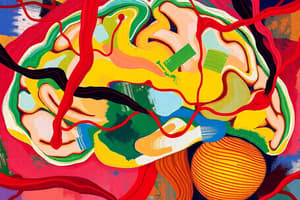Podcast
Questions and Answers
What is the definition of a haematoma?
What is the definition of a haematoma?
- A clot of blood that forms (correct)
- The act of bleeding
- A weakened blood vessel
- A short lived blockage in blood supply to the brain
What is the most common type of aneurysm?
What is the most common type of aneurysm?
- Congenital aneurysm
- Cerebral aneurysm
- Acquired aneurysm
- Berry aneurysm (correct)
What can lead to life-threatening internal bleeding?
What can lead to life-threatening internal bleeding?
- Transient ischaemic attack
- Aneurysm rupture (correct)
- Thrombolysis
- Cerebral haemorrhage
What causes a transient ischaemic attack or mini-stroke?
What causes a transient ischaemic attack or mini-stroke?
What is the definition of thrombolysis?
What is the definition of thrombolysis?
What is the meaning of embolus?
What is the meaning of embolus?
What is the result of a blood clot traveling to the brain as an embolus?
What is the result of a blood clot traveling to the brain as an embolus?
What is the effect of a ruptured aneurysm at its most severe stage?
What is the effect of a ruptured aneurysm at its most severe stage?
What is the most common cause of cerebral hemorrhages?
What is the most common cause of cerebral hemorrhages?
What is the cause of a transient ischaemic attack or mini-stroke?
What is the cause of a transient ischaemic attack or mini-stroke?
What is the definition of a haematoma?
What is the definition of a haematoma?
What happens when an aneurysm occurs at weak points in the wall of an artery or heart?
What happens when an aneurysm occurs at weak points in the wall of an artery or heart?
Flashcards are hidden until you start studying
Study Notes
- Transient ischaemic attack (TIA) or mini-stroke is a temporary blockage in the blood supply to the brain
- Haemorrhagic stroke is a type of stroke caused by bleeding in the brain
- Aneurysms are weakened areas in the wall of an artery or heart, which can bulge or rupture, leading to internal bleeding
- Most common type of aneurysm is the berry aneurysm, which usually occurs at branching points of cerebral arteries
- Aneurysms are more common in young patients with stroke and are often the cause of subarachnoid haemorrhage
- Aneurysms can be caused by congenital muscular weakness at branching points or acquired due to atherosclerosis
- About 60% of cerebral haemorrhages are linked to high blood pressure, which can lead to aneurysms and increase the risk of bleeding.
Blood clots can travel from elsewhere in the body, such as the heart, and become emboli in the brain, causing blockages in the arteries and leading to ischaemic or haemorrhagic strokes. A haemorrhage is the act of bleeding, and a haematoma is the clot of blood that forms in the affected area. High blood pressure can weaken the vessel wall, increasing the risk of aneurysm formation and potentially life-threatening bleeding. Aneurysms occur at weak points in the wall of an artery or heart and can rupture, leading to massive bleeding. The most severe stage of an aneurysm can lead to subarachnoid haemorrhage, which is commonly seen in young patients with stroke. The berry aneurysm is the most common type of aneurysm and typically occurs at branching points of cerebral arteries. Congenital muscular weakness at branching points can lead to aneurysm formation. About 60% of cerebral haemorrhages are linked to high blood pressure, and untreated high blood pressure can lead to aneurysms and increased risk of bleeding.
Studying That Suits You
Use AI to generate personalized quizzes and flashcards to suit your learning preferences.




